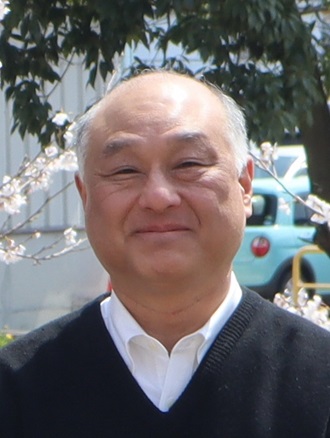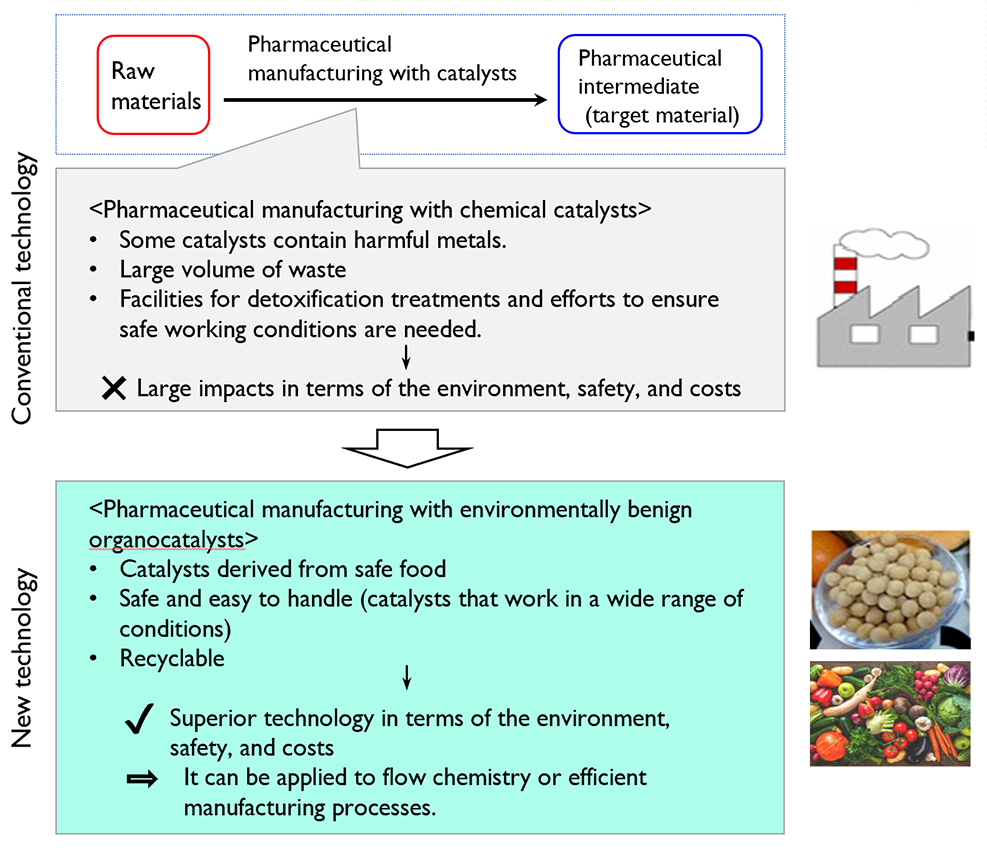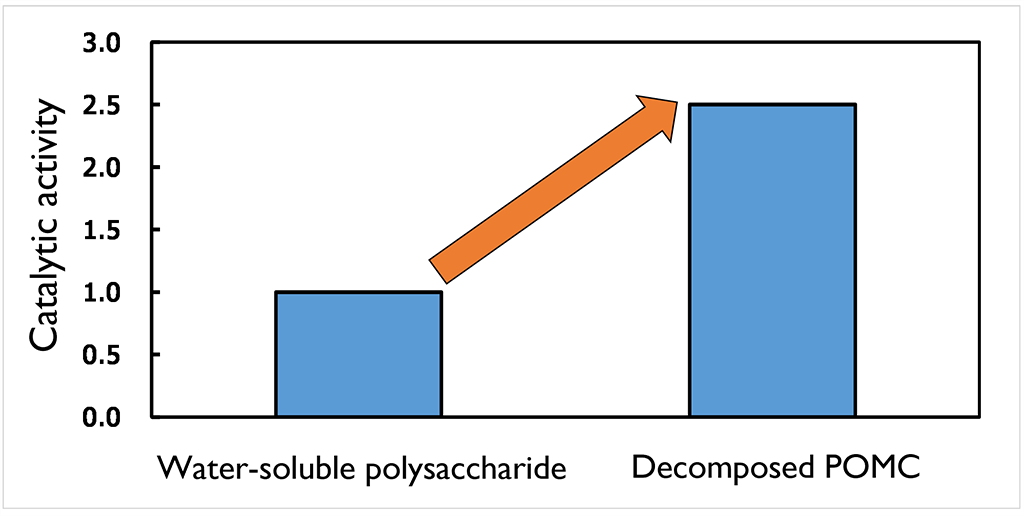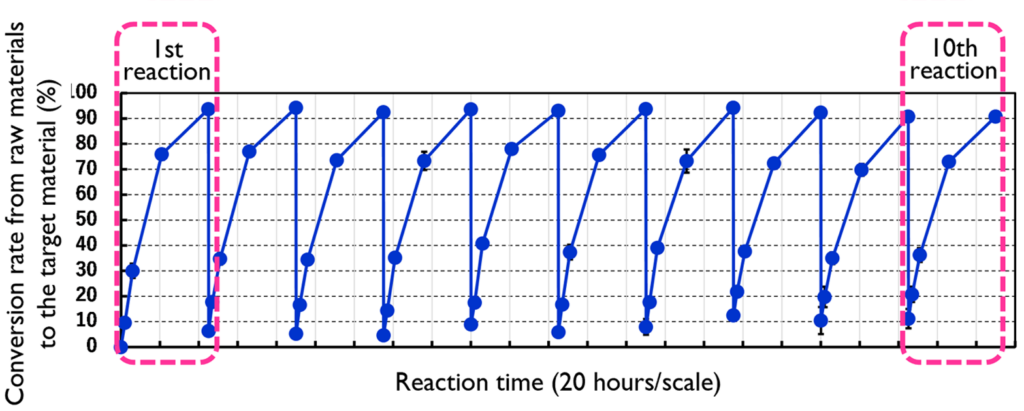The world’s first successful development of a catalyst derived from a plant—Environmentally benign organocatalyst from Toyama—

Professor
【Research Theme】
Develop an organocatalyst derived from a plant for pharmaceutical synthesis
【Research Highlights】
・This environmentally benign organocatalyst is the world’s first asymmetric catalyst whose main component is a polysaccharide derived from a plant.(*1)
・This environmentally benign organocatalyst is an innovative catalyst that works at low cost, is very safe, and does not produce substances of concern through pharmaceutical manufacturing processes compared to conventional methods using chemical catalysts, such as noble or rare metals.
*1 Kyowa Pharma Chemical was the first in the world to discover a polysaccharide derived from a plant that works as an asymmetric catalyst. (According to a survey by Kyowa Pharma Chemical CO., LTD from public information as of June 1, 2022)
【Background and History】
Many drug substances have different properties regarding their drug efficacy, toxicity, and biokinetics between enantiomers, and in many cases, either enantiomer should be used in a drug. Therefore, asymmetric catalysts of a metal element, such as palladium, bonded to organic compounds with complex structures (ligands) are used to produce only single enantiomer. Using metals, however, has several issues, including the risk of high toxicity if they remain, and they are difficult to recycle. Even though metals are rare resources, they are thrown away as waste products. Organocatalysts, a topic of the Nobel Prize in Chemistry for 2021, may be able to solve these problems. Organocatalysts are composed of relatively simple molecules, such as amino acids, without potentially harmful metals. They have attracted attention because they are useful in meeting sustainable development goals (SDGs).
Kyowa Pharma Chemical Co., Ltd. (Kyowa Pharma Chemical) first discovered that dry powdered plants behave as organocatalysts through its process development for pharmaceutical intermediates. We can confirm that this powder can be used as a practical catalyst through pilot synthesis of pharmaceutical intermediates with plant components, such as soybeans.(*2) However, organocatalysts have some problems. For example, their catalyst substances need to be clarified, and these catalysts only work for some specific compound manufacturing processes. In order to overcome these problems, we have started a joint research project with Toyama Prefectural University, which has expertise in the field of biocatalysts derived from plants and microorganisms.

*2.Catalytic Asymmetric Amination of meso-Epoxide Using Soy Polysaccharide (Soyafibe S-DN).
Bull. Chem. Soc. Jpn., 2018, 91, 678.
Asymmetric Amination of meso-Epoxide with Vegetable Powder as a Low-toxicity Catalyst.
Molecules, 2020, 25, 3197.
【Research Contents】
This joint research has been supported by Toyama Pharmaceutical Valley Development Consortium, an industry-academia-government collaboration, since 2018. Toyama Prefectural University has, in addition to accepting a research fellow from Kyowa Pharma Chemical, had several of its scientists join the project from the departments of bioengineering and pharmaceutical engineering.
In the early stages of this research, we used water-soluble polysaccharides derived from soybeans as a plant catalyst and later low-molecular-weight polysaccharides. By decomposing them into low-molecular materials through alkali and acid treatments, we successfully isolated the component with catalytic activity (Plant-derived Organic Molecular Catalyst, POMC). After the treatment processes, the molecular weight of the catalyst is reduced by nine-tenths, and its catalytic activity is two to three times greater than the pre-treatment catalyst (Figure 2). Therefore, useful compounds, such as drug substances, can be manufactured with small amounts of the catalyst.

Figure 2. Improving the catalytic activity by decomposition
Our successfully treated POMC can work even in water, which is more environmentally friendly. Moreover, we also confirmed that POMC can be recycled more than 10 times without declines in its effectiveness (Figure 3).

Figure 3. Changes of conversion rates through reactions
(The effectiveness of the catalyst did not decline after being recycled 10 times.)
【Further Developments】
Toyama Prefectural University and Kyowa Pharma Chemical applied for a patent in March 2022 for their achievement of an environmentally benign organocatalyst.
Clarifying the minimum unit of the organocatalyst in the near future will make systematically designed catalysts possible and expand the catalytic coverage of substrates and reactions.
The catalyst, which we were the first in the world to discover, has superior properties in terms of environmental and safety aspects, so increasing its productivity by optimizing its reaction process will be worthwhile. We continue to uncover its carbohydrate chain and study the design of the catalyst while adopting ideas with different points of view from outside researchers. And through these efforts, we will contribute to achieving the SDGs by developing environmentally friendly manufacturing technologies that are beneficial to people in many fields in addition to pharmaceuticals.
Inquiries
Please get in touch with us